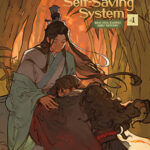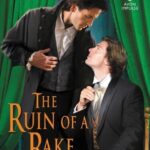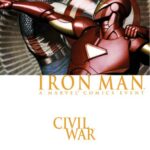This week’s prompt from Top Ten Tuesday is “The Characters Authors Surprisingly Redeemed”. A lot of people are taking it as characters that had a literal redemption arc within the story, but the prompt notes say that it’s about characters you grew to love — which is sometimes the same thing, but not always.
I admit, I’m struggling with this one, but it’s always easier once I start listing them out. Let’s give it a shot! Given the nature of the prompt, there are some spoilers here, and I’m afraid I’ve written a bit of an essay for point #3. Sorry not sorry!
- Seivarden Vendaai, from Ancillary Justice (Ann Leckie). Seivarden is a difficult character all round, drug-addicted and arrogant and not always ready to help herself. She’s devoted to Breq, though, and devoted to being better than she was: each time I reread it, I find myself going through the same journey where somehow I start rooting for her, and being sad when she’s not part of the action. Every time, it’s hard to pinpoint the exact moment it happens — and Seivarden’s choices can still be completely infuriating even once you’ve passed that tipping point — but every time, I come to the same conclusion. I might not like Seivarden as a person, but as a character she’s great.
- Artis Corbin, from A Long Way to a Small Angry Planet (Becky Chambers). He’s never going to be a super-likeable character, but he does go through some character growth. It’s difficult to say I like the character, and I’m always torn whether I agree with his most significant choice (i.e. his choice to give Ohan the antidote against their stated wishes), but I did grow to appreciate him more. It’s possible that’d work even better if he was a more major character and there was more time spent on it, but on the other hand, he’s such an ass most of the time that that’d probably be unbearable.
- Shen Qingqiu/Shen Yuan, from The Scum Villain’s Self-Saving System (Mò Xiāng Tóng Xiù). Bear with me here. In SVSSS, Shen Yuan transmigrates into a story called Proud Immortal Demon Way, becoming a character who happens to be the villain of the story. There’s some literal redemption here, as Shen Yuan inhabits the role of Shen Qingqiu, changes the story, treats people well and ultimately becomes the lover of a character that, in the original, Shen Qingqiu abused. But I’m also referring to Shen Yuan’s journey as a person, because he starts out with all kinds of assumptions and refuses to really be a part of the world he’s ended up in, and ultimately we see him accept his place in it, fall in love, and get over some of his internalised self-hate about the fact that he’s gay. It drove me batty the first time I read the series, but I think actually we’re being shown a journey toward self-acceptance, rather than a narrative that’s inherently homophobic from the get-go. (This is confirmed for me by reading MXTX’s Heaven Official’s Blessing, where Xie Lian and Hua Cheng’s love for one another is pretty matter-of-fact, with no sign of Shen Yuan’s constant “no homo”.)
That’s my interpretation, admittedly, because he never really admits that he’s gay, and the narrative is always limited to his point of view: the only internal thoughts and feelings we get to hear about are his, filtered through the fact that he doesn’t really understand his own feelings. But throughout, he talks a big game about the pretty women in Proud Immortal Demon Way, but shows no actual interest in anyone except Luo Binghe, whom he ends up marrying. The story ends before their marriage (which is covered in the extras), and Shen Yuan clearly has a long way to go still… But he’s getting there, and we see that in his decision to say yes to marrying Luo Binghe, and the fact that after their wedding night, he quietly calls Luo Binghe “husband” just because he wants to try out how it sounds (despite being typically quite cagey about such open affection).
So yeah, Shen Yuan literally redeems the character of Shen Qingqiu, but he also redeems himself — in a way he might never have managed if he hadn’t died and transmigrated into Proud Immortal Demon Way. - Edmund Pevensie, from The Lion, the Witch and the Wardrobe (C.S. Lewis). Any other time I might not think of this one, but I’ve been doing a bit of a Narnia reread, so he leaped to mind. He has a literal narrative redemption, of course, in that he starts out a traitor and is redeemed by Aslan, but for me I really came to like how he’d grown and changed from that in Prince Caspian. He’s still sometimes disagreeable, but he’s also a bit more self-aware, and wants to ultimately do the right thing.
In The Voyage of the Dawn Treader, Eustace has a bit of a similar journey to Edmund, though he’s just more of a childish ass compared to Edmund’s out-and-out treachery. Like Edmund, we see the journey of a flawed boy who tries to work on it and become better, and he still has petty little outbreaks at first. I’m not actually a big fan of The Silver Chair or later books, but Eustace’s journey continues there. He never becomes a person I’d unequivocally like, but he does become a person who’s working on himself, and that’s admirable. - Lord Courtenay, from The Ruin of a Rake (Cat Sebastian). Technically, Courtenay’s getting redeemed after his appearance in The Lawrence Browne Affair, where we mostly just see him as a dissolute playboy. Cat Sebastian does this really well, though: you’ll see a character from one perspective in a given book, and then in the next, you come to understand what’s going on beneath, and even root for that character. Courtenay’s been genuinely misunderstood, as well as making some serious mistakes, and this book quickly establishes that and works toward a happy ending for him that, when it comes, is extremely satisfying. He also has a literal redemption arc where he becomes a bit more socially acceptable and should be able to see his beloved nephew again.
From the same book, I think Julian also had a bit of a redemption arc for me: he’s already socially acceptable, super acceptable in fact, but it sometimes makes him act like a bit of an ass. Contact with Courtenay softens him up a bit and begins to show him that he can be acceptable enough to society and also have the things he wants. So while he doesn’t have a literal redemption per se, for me he went from being a bit too stiff and focused on appearances to being warmer and more likeable. - Thomas Wilker, from A Natural History of Dragons (Marie Brennan). Tom starts off pretty unlikeable, because he and Isabella can’t see one another’s value, and each is fighting against different societal barriers against them becoming scientists. Isabella’s a woman, and Tom’s lower class, and neither of them are welcome. At first it’s each of them against the world alone, but gradually (by the end of the first book, and increasingly throughout the remainder of the series), they join forces and become a lot more than they might be alone. We never get to see a lot of Tom’s personal life, now that I think about it, and in a way I regret that — Isabella’s so focused on dragons, it makes sense that she’s comparatively unaware of Tom’s emotional life (except where it relates to her). But now that I’m thinking about it, I’m definitely wondering!
- Luke Doomsday, from A Nobleman’s Guide to Seducing a Scoundrel (KJ Charles). Luke’s never quite unlikeable, but you’re very aware of his flaws while reading, for sure. He’s keeping things from Rufus — who would help him if he only asked — and abusing Rufus’ trust. Even if he doesn’t mean to harm Rufus, he definitely causes harm. And it’s not just Rufus, either; Luke is a hurt boy lashing out, in many ways, and he keeps on hurting those around him because of it. Still, through the course of the novel, he comes to terms with it and starts to be a bit more honest with people, and to heal.
- Tony Stark, from Civil War: Iron Man (Brian M. Bendis, etc). No, not the movie, but from the original Civil War event in the comics. This particular volume was focused on Iron Man, and his reaction to Steve Rogers’ death. Unlike the movies, it really made me understand Tony Stark’s point of view throughout Civil War, and focused on the deep affection and respect he felt for Steve even while they were at odds. Admittedly, the whole part in Camelot is just weird, but in my view, the movies really needed to adapt this volume as well in order to make Tony’s character gel, and they didn’t.
- Ged, from A Wizard of Earthsea (Ursula Le Guin). Ged’s not quite unlikeable, in the early chapters of the story, because it’s kind of above whether you like or dislike the characters. Ged is arrogant and incapable of admitting when he’s wrong or when he doesn’t know something, and we see him painfully and slowly learn humility, and then real courage and real power. In the later books, we see that pushed further, as Le Guin dismantled some of the sexist assumptions she built into the world, and widens everyone’s point of view.
- Paul Schafer, from The Summer Tree (Guy Gavriel Kay). It’s been a while since I read these books, but I keep being tempted to revisit, because against all odds, it’s a really good portal fantasy (and I enjoy what it does with Arthurian mythology as well). Paul is a difficult character to like at first, but you quickly understand that his reserve is due to an immense burden of guilt. He never becomes the warmest character, but he does learn to care again, and to forgive himself too. In some ways it’s not an easy read because what Paul suffers — and the other characters too — is immense and sometimes very dark. But it is a lovely trilogy.
Whew, we got there! And I didn’t write too many essays…
I’m sure there are other characters I can’t think of right now, and also obvious characters I missed out somehow, but I always treat Top Ten Tuesday prompts as an opportunity to dig around and maybe come up with something different.











Edmund is a great pick!
Yeah, he made my list as well. The “Scum Villain” book sounds interesting — having a narrator who’s unreliable because he’s not sure of his own thoughts/feelings is an interesting take, kind of like “Rachel’s Holiday” wherein the main character proves to be unreliable, but because she’s lying to herself about having a substance abuse problem.
Yes, it’s definitely interesting! I wasn’t sure when I first read it how much of that was intentional, but looking at the author’s other work, I’m pretty certain we’re meant to see Shen Yuan as closeted to the max, and totally divorced from his own feelings and inclinations (not just his sexuality, but a lot of how he relates to the world). He doesn’t even show any sadness for the fact that he’s died and left his family/life behind.
He’s a great example of someone who goes through both kinds of redemption — plot redemption, and also going from not liking him to appreciating him as a character. 😀
A great collection of characters!
Pam @ Read! Bake! Create!
https://readbakecreate.com/books-with-yellow-covers-pick-a-color/
Thank you!
I completely agree on Edmund and Eustace! Though I have to admit… even though The Silver Chair has always been my favorite of the Narnia books, I’ve always liked Edmund better than Eustace as a character.
I don’t know why I don’t like The Silver Chair more… I think it has less nostalgia for me, I’d usually get distracted by that point in reading the series as a kid, and start over again from the first book the next time I read it. I didn’t read it half as much as the others. XD
I only read a few books from your list (A Long Way to a Small, Angry Planet, The Lion, The Witch, and the Wardrobe, and A Natural History of Dragons), but long enough ago that I don’t remember the characters and their redemption arcs! I’m rereading A Long Way soon though because it’s a buddy read!
Ahh, I do love rereading Becky Chambers’ work, it’s always so warm and comforting. Hope you enjoy!
I completely forgot about Edmund. Thank you for sharing him!
I’d probably have forgotten too if it weren’t for my recent reread! But those books were so formative for me, too.
Great choices with Edmund and Thomas!
Tom Wilker in particular doesn’t have such an obvious redemption arc, but I really disliked him at first and then… it becomes so clear why he starts out unpleasant! It’s really well done.
Great choices! The Narnia books are the only ones I’ve rad but Edmund was the first character that came to mind when I saw the topic.
I haven’t read A Long Way to a Small and Angry Planet yet, but I really want to!
I twisted this week’s topic a bit, but have a look: https://franlaniado.wordpress.com/2024/09/17/top-ten-tuesday-corruption-arcs/
Oh, A Long Way to a Small Angry Planet is a favourite of mine — hope you enjoy it!
Julian definitely had a redemption arc for me, more than Courtenay! I hated him not only for his devotion to propriety and the status quo, but his judgemental attitude and the way he, as Courtenay put it, hurt a stranger who had never harmed him, and then lied about it.
I think the biggest KJC redemption arc for me was Kim from the Will Darling books. I bounced so hard off that because of what a shit Kim was even by the end of the first book (Will’s arc in the 3rd book feels less like redemption and more like healing, even if he feels like an arse who needs to do better. Mate, you did pretty good with that PTSD there).
Yeah, I agree that Julian is the less likeable of the two by quite a long chalk. He has the less literal redemption arc, which is why he didn’t jump to mind first.
Ah Edmund is a great pick. He grows a lot throughout his stories.
I could never make it past a lot of the other books in Narnia and struggled with The Silver Chair.
I’m glad it’s not just me! I did read them all eventually, but I’d just as often stop at The Voyage of the Dawn Treader, heh.